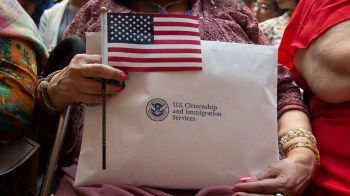A crackdown year for illegal immigrants
TEXT OF INTERVIEW
Lisa Napoli: All week, we’ve been talking to our reporters around the world about the beats they cover every day. Today, a conversation with Dan Grech, our Americas correspondent, on the topic of immigration. He comes to us via WLRN in Miami.
Dan Grech: This was supposed to be the year of comprehensive immigration reform, and it turned into the year of the crackdown on illegal immigrants. And when you listen to the presidential debates, the number one topic of conversation is greater enforcement of the border and an increased crackdown in the year to come of illegal immigrants in the U.S. economy.
Napoli: We’ve had lots of talk, like you say, and lots of bravado. But has there been any indication that any of this is working?
Grech: There’s been a mixed record there. One of the trends that we’re seeing now is that businesses are being asked to enforce the United States’ immigration laws. A great example of that was the Social Security number crackdown. What typically has happened is illegal immigrants have given false Social Security numbers, and businesses kind of looked the other way and employed them. But when the Bush Administration asked businesses to actually start enforcing the no matches that they’re finding in the databases, businesses pushed back — they said that it would be too much money and too difficult, and it would put at risk legal immigrants, or legal native-born Americans, who were also going to be ensnared in the crackdown.
One of the other things that’s happened this year is we’ve tightened border security, but one of the things that’s interesting is that economists have found that lower apprehensions are directly tied to slow-downs in the economy. And so what really might be happening is that it’s not a better border security, but a slower economy that’s causing fewer immigrants to try to cross.
Napoli: Dan, it seems like the government is saying, “We’re not so sure how we can handle this,” so they’re shifting the responsibility onto the businesses, which as you say have been complicit in all of this — a lot of winking and nodding going on. But how has this affected businesses?
Grech: Well, I think a lot of businesses are in fear. One of the loudest alarm bells is being rung by the farming industry. What increasingly is emerging is that native-born Americans simply are unwilling to do the kind of back-breaking farm work, no matter the price. If you were willing to pay people enormous amounts of money to pick crops, it would increase food prices astronomically.
Napoli: Let’s talk for a minute about remittances, which I guess have flattened out for Latin America for the first time in years. What does that mean?
Grech: Well, remittances are the money that immigrants send home to their families from the country that they left. And remittances have traditionally undergirded many of the economies — particularly in Mexico and Central America and the Caribbean — and were growing at incredible paces, 20 percent a year, and totally $40 billion for the region. What happened this year is for the first time in a decade, remittances flattened out. The reason remittances are going down is because the U.S. economy is slowing, and what that means is literally millions of poor people around the world are feeling the effects of that.
Napoli: That’s our Dan Grech in Miami with a year-end look at immigration. In Los Angeles, I’m Lisa Napoli. Happy new year.
There’s a lot happening in the world. Through it all, Marketplace is here for you.
You rely on Marketplace to break down the world’s events and tell you how it affects you in a fact-based, approachable way. We rely on your financial support to keep making that possible.
Your donation today powers the independent journalism that you rely on. For just $5/month, you can help sustain Marketplace so we can keep reporting on the things that matter to you.


















